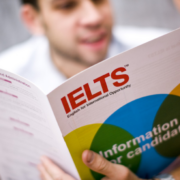Common Myths About IELTS English Test
The International English Language Testing System (IELTS) is a widely recognized and accepted English language proficiency test used for various purposes, including immigration, academic admission, and professional certification. Despite its prevalence, there are numerous myths and misconceptions surrounding the IELTS English test. In this comprehensive blog post, we will debunk common myths associated with IELTS, providing clarity and insights for individuals preparing for this important assessment.
Also Read: Transitioning from Nursing to a Medical Career
Understanding the IELTS English test
Begin by providing a brief overview of the IELTS test, its significance, and the key components, including Listening, Reading, Writing, and Speaking. Emphasize that IELTS is designed to assess a candidate’s ability to use English in real-life situations, making it a valuable tool for individuals seeking to study, work, or migrate to English-speaking countries.
Myth 1: IELTS is Only for Academic Purposes
Dispelling the myth that IELTS is exclusively for academic purposes. Discuss how IELTS serves both academic and general purposes, with the Academic Module tailored for individuals applying to universities, and the General Training Module designed for those seeking immigration or working in an English-speaking environment.
Myth 2: There is a Pass or Fail Score in IELTS
Clarify the misconception that IELTS has a pass or fail score. Explain that IELTS provides a band score ranging from 0 to 9 for each module, indicating the level of English proficiency. Different organizations and institutions may have specific score requirements, and there is no absolute “pass” or “fail.”
Myth 3: American English is Preferred Over British English in IELTS
Address the belief that American English is favored over British English in the IELTS test. Dispel this myth by emphasizing that IELTS is designed to be international and accepts both American and British English equally. Test-takers can use either variant, and they won’t be penalized for their choice.
Myth 4: Guesswork Affects Scores Negatively
Debunk the myth that guesswork can significantly affect scores negatively. Explain that the IELTS English test doesn’t penalize for incorrect answers, and it is advantageous for candidates to attempt all questions even if they are unsure. Encourage a strategic approach to maximize the potential for correct answers.
Myth 5: Speaking Test is All About Fluency
Address the misconception that the Speaking test is solely about fluency. Emphasize the importance of presenting well-structured responses with a balance of fluency and accuracy.
Myth 6: The More Words, the Better in the Writing Test
Dispense with the belief that longer essays or responses lead to better scores on the Writing test. Explain that quality is more important than quantity, and test-takers should focus on delivering well-developed, coherent, and relevant content within the specified word limits.
Myth 7: Only Native Speakers Can Achieve High Scores
Challenge the misconception that only native English speakers can achieve high scores in IELTS. Highlight that IELTS is designed to assess proficiency, and individuals from non-native English-speaking countries routinely achieve top scores with adequate preparation, practice, and familiarity with the test format.
Myth 8: Formal English is Required in the Speaking Test
Address the misconception that test-takers must use overly formal English in the Speaking test. Emphasize that a natural, conversational style is acceptable, and test-takers should focus on effective communication rather than overly formal language.
Myth 9: IELTS Can Be Crammed for at the Last Minute
Challenge the notion that IELTS can be successfully crammed at the last minute. Emphasize that IELTS assesses overall language proficiency, which requires consistent practice and improvement over time. Encourage a structured study plan to develop language skills gradually.
Myth 10: IELTS Scores Expire Quickly
Address the misconception that IELTS scores expire quickly. Clarify that IELTS scores are generally valid for two years, providing individuals with a reasonable timeframe to use their results for various purposes, such as university admissions or immigration applications.
Myth 11: Only Native English Examiners Evaluate IELTS Speaking
Dispense with the belief that only native English-speaking examiners evaluate the Speaking test. Explain that IELTS examiners undergo rigorous training and assessments to ensure consistent and fair evaluations. Examiners may be native or non-native speakers with extensive language assessment expertise.
Myth 12: IELTS is Too Difficult to Achieve a High Score
Address the apprehension that IELTS is too difficult to achieve a high score. Reassure test-takers that IELTS is designed to cater to a range of proficiency levels, and with diligent preparation, anyone can attain their desired score.
Conclusion:
In debunking the common myths surrounding the IELTS English Test, it becomes evident that misconceptions often stem from misinformation and hearsay rather than an accurate understanding of the examination. As we conclude this exploration, it is crucial to highlight the significance of dispelling these myths to ensure that candidates approach the IELTS test with confidence, clarity, and a realistic understanding of what to expect.
The first myth addressed is the notion that there is a single “pass” or “fail” outcome in the IELTS English test. In reality, the IELTS score is graded on a band scale, allowing for a nuanced assessment of a candidate’s language proficiency across four skills – listening, reading, writing, and speaking. Understanding this scoring system is vital for candidates as it reflects their language proficiency accurately.












Leave a Reply
Want to join the discussion?Feel free to contribute!